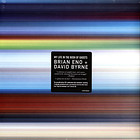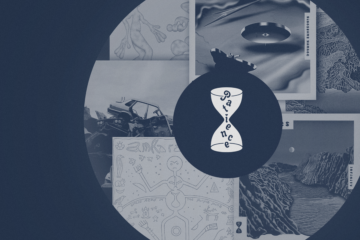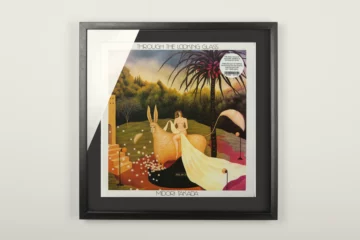First of all, a possible misunderstanding needs to be cleared up: »My Life in the Bush of Ghosts« by Brian Eno and David Byrne is considered an early milestone in pop sampling. Although digital samplers such as the Fairlight CMI were already available when the recordings were made between ‘79 and ‘80, the record was still produced using analogue tapes, and was therefore genuinely handcrafted.
Nor was the record the first to use samples from tapes in pop. Brian Eno testified in 2001 that Holger Czukay’s use of dictaphones represents an early example of this broader area of sampling. Bands like Throbbing Gristle, Cabaret Voltaire and Negativland were also up there with their musical use of tapes. There was also the Mellotron, whose keyboard-playable string recordings were popularised by bands like King Crimson. Or maybe »Revolution 9« by the Beatles? In any case, musique concrète in the ‘40s was probably the first form of systematic sampling.
The first thing that distinguishes »My Life in the Bush of Ghosts« from these previous attempts is the »world music« pop character of the record, which at the time earned it double-digit positions in the British and US charts. This also had something to do with the duo’s specific approach, or more precisely, the balance of power between samples and other instruments. Eno, Byrne and their guest musicians deliver grooves and backing tracks, while they let the voices, which are mainly the samples, take the lead. Hence, in »Regiment«, the combination of the vocals of Lebanese singer Dunya Yunis (spelled »Yusin« on the cover) borrowed from the record »The Human Voice in the World of Islam« (76) and the dry funk served up by Talking Heads’ drummer Chris Frantz, percussionist David van Tieghem and, more than anything else, the uninhibitedly slapping bassist Busta Jones, becomes an ethno number that compels to dance.
In other pieces, the voices take on a more collage-like character, and fragments of spoken sentences are repetitively woven into the beat. This is particularly true of »America Is Waiting« with its indignant radio-show host from San Francisco as the star, or the New York telephone talk radio dialogue between a listener and a politician complete with tribal rolling percussion in »Mea Culpa« or with »Help Me Somebody«, the high-spirited funk sermon by Reverend Paul Morton of New Orleans. This gives the sampling an almost traditional character as far as the role of the voice is concerned, but it is still innovative because of its simulation character. After all, none of the guests were actually in the studio.
Cultural appropriation, so is the accusation. Western musicians using the heritage of other cultures.
Which leads to one of the major criticisms of the record. In addition to Dunya Yunis, who appears on two tracks, there is another Lebanese singer, Samira Tewfik, who contributes her singing skills to the album (described there as Egyptian). Cultural appropriation, so is the accusation. Western musicians using the heritage of other cultures. Is that something they’re allowed to do? Side note: the first pressing of the record still contained the title »Qu’ran« at the start of the B-side with recordings of an Algerian Quran recitation. A year later, it was replaced by »Very, Very Hungry« in the next English pressing. The new and expanded 2006 pressing does not include »Qu’ran«.
Is this imperial global pop? In defence of Brian Eno and David Byrne, one could imply a naive curiosity about things beyond their own front doorstep. Particularly since both musicians, Byrne with the intercontinental pop on his label Luaka Bop, and Eno with his commitment to Afrobeat, have in different ways made a commitment to the perception of musical cultures outside of Europe and the USA. And if stealing voices on »My Life in the Bush of Ghosts« ends up arousing interest in artists like Samira Tewfik or the African-American Moving Star Hall Singers, who also perform live, at least the listening world would not shrink as a result. In no way does sentiment invalidate the objection of the imperial gesture, though. The title of the record comes from the novel of the same name by the Nigerian writer Amos Tutuola, a fairytale-like childlike story about escape from slavery into the realm of the dead. I might never have read it if it wasn’t for the album.










